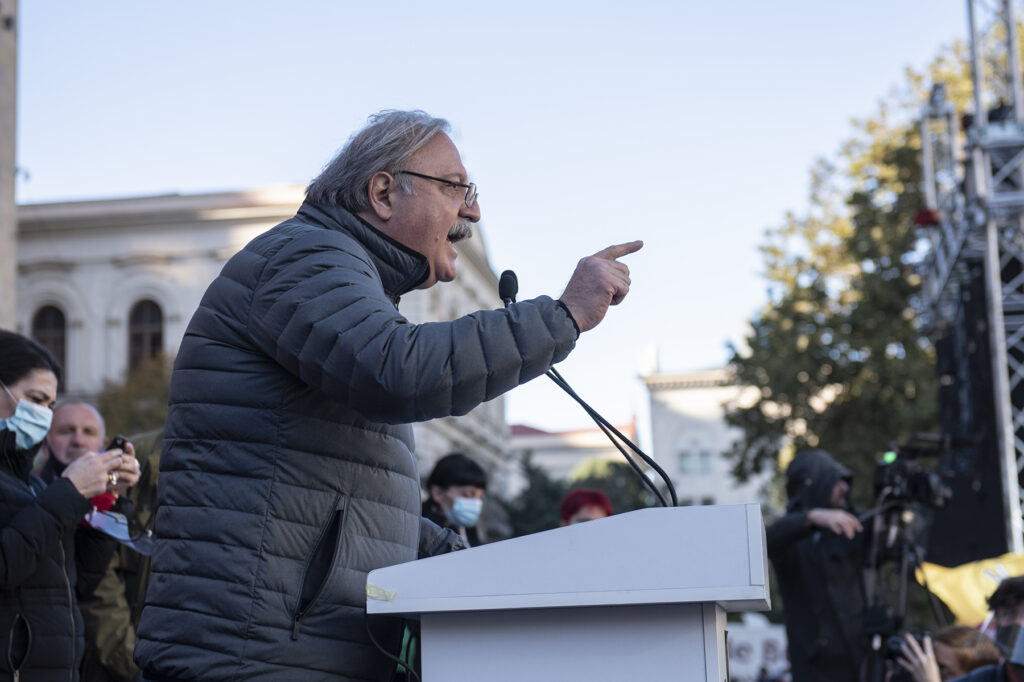Grigol Vashadze, the chair of the United National Movement (UNM), the largest opposition party in Georgia, has announced today that he has retired from politics.
In a farewell announcement published to his Facebook page on 15 December, Vashadze criticised the UNM leadership, without specifying names, over choosing ‘tactics’ without consulting party members, an ‘absence of strategy’, and an inability and unwillingness to learn from mistakes.
Vashadze said this only benefited Georgian Dream, the party that ousted UNM from power in 2012.
He also complained over ‘odious’ people reappearing inside and outside UNM that he insisted belonged to the past and would never allow the party to regain voters’ trust.
UNM came under criticism from both inside and outside the party after the controversial former Interior Minister Ivane Merabishvili, considered by some to be a former political prisoner after he was convicted in 2014 for bribery and other charges, became involved in mobilising the UNM electoral base before 31 October parliamentary election.
The news of Vashadze’s resignation came a day after the Central Election Commission accepted UNM’s rejection of their 36 parliamentary seats and formally abolished UNM’s proportional party list and parliamentary mandate — the latest development in the boycott of the new parliament, which UNM coordinated with seven other opposition groups. According to official results, UNM performed best among the opposition, receiving 27% of the vote.
Grigol Vashadze’s departure is the biggest resignation in the party since January 2017, when the party split and a number of prominent party members left to found the European Georgia Party.
‘Attacks on diplomats’
In the Facebook post explaining his departure from the party, Grigol Vashadze expressed a ‘strong indignation’ over a ‘campaign of attacks and insults against the heads of diplomatic missions of [Georgia’s] strategic allies’ that he insisted ‘gravely damaged’ country’s relations with the United States and the European Union.
The previous day, Georgian ex-President and honorary chair of UNM, Mikheil Saakashvili reprimanded the German Ambassador to Georgia Hubert Knirsch for ‘attacking Georgian history’, after Knirsch ridiculed a comparison between him and European missionaries who did nothing to stop the martyrdom of 17th-century Georgian queen Ketevan made by opposition leader Tamar Charkviani.
That same day, Nika Gvaramia, the founder, director and anchor of Mtavari Arkhi who occupied top government positions under UNM rule, berated Knirsch, the EU Ambassador Carl Hartzell, and the US Ambassador Kelly Degnan for their tolerant positions towards Georgian Dream.
‘This government will inevitably be overthrown and these ambassadors will apologise to Georgian people for such behaviour’, Gvaramia said.

Earlier this week, Gvaramia insisted the US Embassy in Tbilisi had 'politicised staff' that allegedly deprived his TV company of a financial grant on political grounds. Citing ‘Ukrainian sources’, Gvaramia accused the US Ambassador Kelly Degnan of making calls to Washington and Kyiv to stop Mikheil Saakashvili from ‘being appointed to any position’.
Gvaramia also criticised Ambassadors Degnan and Hartzell for not raising their voices about politically motivated prosecutions in Georgia, including his own.
[Read more on OC Media: Former Rustavi 2 director Nika Gvaramia indicted]
Against the backdrop of Saakashvili’s and Gvaramia’s statements, Grigol Vashadze found himself increasingly isolated, especially after 12 November when he advocated for negotiations with Georgian Dream as the opposition hit the streets to demand a new election.
While most of his critics denied any knowledge of the talks and showed little enthusiasm for the idea, all of them soon joined Georgian Dream at the negotiating table, brokered by foreign Tbilisi’s foreign diplomatic corps.
[Read more on OC Media: UNM leader sidelined after suggesting ‘dialogue’ with Georgian Dream]
Chair but not a party candidate
Grigol Vashadze found himself at odds with his predecessor and party founder, third Georgian President Mikheil Saakashvili several times.
Though Grigol Vashadze was the chair of UNM, on 7 September Strength in Unity named Mikheil Saakashvili as their prime-ministerial candidate instead — despite the fact that Saakashvili had only Ukrainian citizenship and was wanted by Georgian justice.
Grigol Vashadze ran instead for mayor of the city of Kutaisi. He did not win.
In a September poll by Edison Research commissioned by TV company Formula, Grigol Vashadze came third with 18% support as the most favourite leader among opposition supporters, with Mikheil Saakashvili trailing behind at 15%.
In February, Vashadze denied he was stepping down as a chairman after an alleged conflict with Saakashvili following the ex-President's announcement about the creation of a new 'headquarters' in Tbilisi to 'save Georgia from Ivanishvili's regime'.
Saakashvili’s initiative found little support and approval among the UNM allies, especially as it came after UNM had already formed a platform with other major opposition groups. On 8 March, after negotiations with UNM, the opposition platform announced that they had won a series of concessions from the Georgian Dream, including a more proportional voting system.
[Read more on OC Media: ‘Multi-member constituencies’ proposed as Georgian Dream– opposition talks restart]
Sixteen days after the deal, Grigol Vashadze replaced Mikheil Saakashvili as a party chair.





 15 December 2020
15 December 2020



